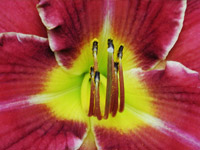All About Growing Day lilies

Daylilies belong to the plant genus Hemerocallis. The word Hemerocallis comes from the Greek meaning "beauty" and "day" and refers to the fact that each daylily flower lasts only one day.
However, since there are many flower buds on each daylily stalk, and many stalks in each daylily plant, and many daylily plants in a daylily clump, the total flowering period of a daylily plant isn't limited to a single day, but usually spans several weeks. Many daylily cultivars also have more than one flowering period.
The day lily has become one of the world's most popular flowering perennials.
It's easy to see why daylilies are so popular with gardeners - they are an easy to grow perennial with a hardy constitution. Day lilies can withstand harsh treatment and can flourish and grow in different soil, sunlight, and water conditions. Daylilies are bothered by few insects or pests and their relative resistance to disease makes them one of the most dependable perennials around.
Daylilies work well planted as specimen plants and are also excellent when planted in mass or used as a ground cover. They work well to help establish banks or in areas where erosion is a problem. Daylilies also work well to help to cover the yellowing foliage of other plants and early spring bulbs like daffodils and tulips.
Native to Asia, daylilies were introduced to Europe in the 1500's. Although early collecting and hybridizing attempts were made throughout the years, it has only been in the last 100 years that the hybridization of daylilies has truly exploded and helped to create the "modern" daylily.
The hybridization of daylilies has led to over 40,000 different varieties registered with hundreds of new daylilies added to the registrar each year. Modern hybrid daylilies are available in a multitude of colors, sizes, and shapes and can add tremendously to the beauty of new or established gardens.

